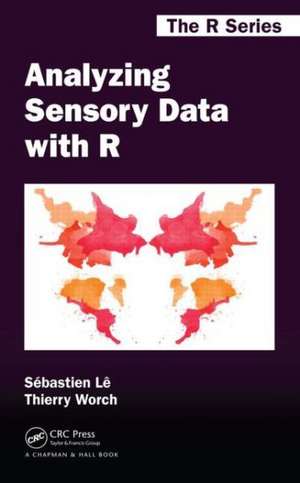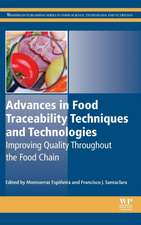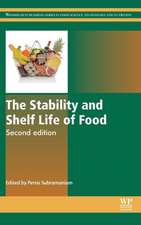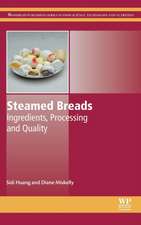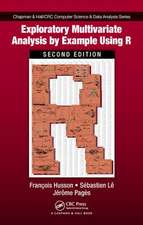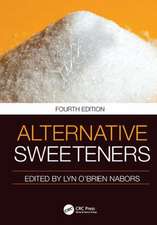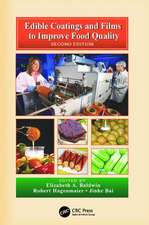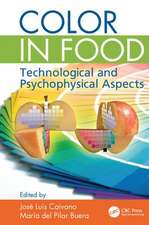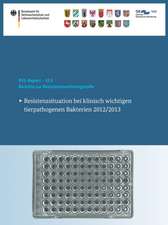Analyzing Sensory Data with R: Chapman &Hall/CRC The R Series
Autor Sebastien Le, Thierry Worchen Limba Engleză Hardback – 9 oct 2014
Analyzing Sensory Data with R gives you the foundation to analyze and interpret sensory data. The book helps you find the most appropriate statistical method to tackle your sensory data issue.
Covering quantitative, qualitative, and affective approaches, the book presents the big picture of sensory evaluation. Through an integrated approach that connects the different dimensions of sensory evaluation, you’ll understand:
- The reasons why sensory data are collected
- The ways in which the data are collected and analyzed
- The intrinsic meaning of the data
- The interpretation of the data analysis results
Din seria Chapman &Hall/CRC The R Series
-
 Preț: 350.97 lei
Preț: 350.97 lei - 20%
 Preț: 542.75 lei
Preț: 542.75 lei - 20%
 Preț: 424.83 lei
Preț: 424.83 lei -
 Preț: 343.33 lei
Preț: 343.33 lei -
 Preț: 358.31 lei
Preț: 358.31 lei - 20%
 Preț: 548.70 lei
Preț: 548.70 lei - 8%
 Preț: 490.79 lei
Preț: 490.79 lei - 23%
 Preț: 1327.47 lei
Preț: 1327.47 lei - 8%
 Preț: 452.20 lei
Preț: 452.20 lei -
 Preț: 401.00 lei
Preț: 401.00 lei - 8%
 Preț: 386.32 lei
Preț: 386.32 lei -
 Preț: 389.18 lei
Preț: 389.18 lei -
 Preț: 391.58 lei
Preț: 391.58 lei -
 Preț: 152.13 lei
Preț: 152.13 lei - 8%
 Preț: 512.40 lei
Preț: 512.40 lei - 20%
 Preț: 421.06 lei
Preț: 421.06 lei -
 Preț: 356.64 lei
Preț: 356.64 lei - 8%
 Preț: 418.06 lei
Preț: 418.06 lei -
 Preț: 373.05 lei
Preț: 373.05 lei - 8%
 Preț: 544.65 lei
Preț: 544.65 lei -
 Preț: 359.67 lei
Preț: 359.67 lei - 8%
 Preț: 437.63 lei
Preț: 437.63 lei -
 Preț: 358.23 lei
Preț: 358.23 lei -
 Preț: 260.54 lei
Preț: 260.54 lei - 8%
 Preț: 422.38 lei
Preț: 422.38 lei - 8%
 Preț: 438.87 lei
Preț: 438.87 lei -
 Preț: 356.64 lei
Preț: 356.64 lei - 20%
 Preț: 308.68 lei
Preț: 308.68 lei -
 Preț: 230.57 lei
Preț: 230.57 lei - 17%
 Preț: 271.58 lei
Preț: 271.58 lei - 15%
 Preț: 494.20 lei
Preț: 494.20 lei -
 Preț: 392.34 lei
Preț: 392.34 lei - 9%
 Preț: 835.80 lei
Preț: 835.80 lei - 20%
 Preț: 1329.88 lei
Preț: 1329.88 lei - 22%
 Preț: 447.69 lei
Preț: 447.69 lei - 24%
 Preț: 566.03 lei
Preț: 566.03 lei - 35%
 Preț: 842.05 lei
Preț: 842.05 lei - 18%
 Preț: 1082.45 lei
Preț: 1082.45 lei - 20%
 Preț: 578.11 lei
Preț: 578.11 lei - 26%
 Preț: 1014.74 lei
Preț: 1014.74 lei - 20%
 Preț: 1066.99 lei
Preț: 1066.99 lei - 27%
 Preț: 527.72 lei
Preț: 527.72 lei
Preț: 629.11 lei
Preț vechi: 879.10 lei
-28% Nou
Puncte Express: 944
Preț estimativ în valută:
120.38€ • 128.73$ • 100.37£
120.38€ • 128.73$ • 100.37£
Carte tipărită la comandă
Livrare economică 17 aprilie-01 mai
Preluare comenzi: 021 569.72.76
Specificații
ISBN-13: 9781466565722
ISBN-10: 1466565721
Pagini: 374
Ilustrații: 112 black & white illustrations, 2 black & white tables
Dimensiuni: 156 x 234 x 23 mm
Greutate: 0.68 kg
Ediția:1
Editura: CRC Press
Colecția Chapman and Hall/CRC
Seria Chapman &Hall/CRC The R Series
ISBN-10: 1466565721
Pagini: 374
Ilustrații: 112 black & white illustrations, 2 black & white tables
Dimensiuni: 156 x 234 x 23 mm
Greutate: 0.68 kg
Ediția:1
Editura: CRC Press
Colecția Chapman and Hall/CRC
Seria Chapman &Hall/CRC The R Series
Cuprins
Quantitative Descriptive Approaches: When panelists rate products according to one single list of attributes. When products are rated according to one single list of attributes. When products are rated according to several lists of attributes. Qualitative Descriptive Approaches: When products are depicted by comments. When two different products are put in various experimental contexts. When products are grouped into homogeneous clusters. When products are positioned onto a projective map. Affective Descriptive Approaches: When products are solely assessed by liking. When products are described by both liking and external information "independently." When products are described by a mix of liking and external information. Appendices. Index.
Recenzii
"Lê and Worch present students, academics, researchers, and statisticians with a quantitative, qualitative, and effective approach to sensory evaluation. The authors have organized the bulk of their text in three sections, devoted to quantitative descriptive approaches, qualitative descriptive approaches, and affective approaches, in turn. Individual chapters within these sections cover a variety of subjects, such as product rating according to a single list of attributes, product rating when depicted by comments, and product rating when solely assessed by liking."
—Ringgold, Inc. Book News, February 2015
"…a comprehensive and practical book written for sensory scientists. The book introduces techniques for the analysis of sensory data with a strong emphasis on multivariate analysis. Throughout the book, real data from a variety of sensory experiments are used to illustrate how to analyze sensory data appropriately using R. … The examples used in the book emphasize a good understanding of the objective of the experiment, the nature of the data collected and its statistical notation, how to implement the appropriate method of analysis using R, and how to read the output and carefully interpret the results. … Sensometrics is a dynamic and fast-moving field, yet books on how to analyze complicated sensory data are rare. This practical book is a valuable resource for scientists learning how to analyze sensory data appropriately. It can be used as a course textbook to teach new sensory scientists the full suite of existing statistical techniques, or as a reference handbook for the experienced sensory scientist seeking information on how to analyze a specific type of sensory data. … well-organized, easy to read, and provides practical instruction in statistical techniques for analyzing sensory data using R."
—Gui-Shuang Ying, University of Pennsylvania, in Journal of the American Statistical Association, January 2017
"Lê and Worch present students, academics, researchers, and statisticians with a quantitative, qualitative, and effective approach to sensory evaluation. The authors have organized the bulk of their text in three sections, devoted to quantitative descriptive approaches, qualitative descriptive approaches, and affective approaches, in turn. Individual chapters within these sections cover a variety of subjects, such as product rating according to a single list of attributes, product rating when depicted by comments, and product rating when solely assessed by liking."
—Ringgold, Inc. Book News, February 2015
—Ringgold, Inc. Book News, February 2015
"…a comprehensive and practical book written for sensory scientists. The book introduces techniques for the analysis of sensory data with a strong emphasis on multivariate analysis. Throughout the book, real data from a variety of sensory experiments are used to illustrate how to analyze sensory data appropriately using R. … The examples used in the book emphasize a good understanding of the objective of the experiment, the nature of the data collected and its statistical notation, how to implement the appropriate method of analysis using R, and how to read the output and carefully interpret the results. … Sensometrics is a dynamic and fast-moving field, yet books on how to analyze complicated sensory data are rare. This practical book is a valuable resource for scientists learning how to analyze sensory data appropriately. It can be used as a course textbook to teach new sensory scientists the full suite of existing statistical techniques, or as a reference handbook for the experienced sensory scientist seeking information on how to analyze a specific type of sensory data. … well-organized, easy to read, and provides practical instruction in statistical techniques for analyzing sensory data using R."
—Gui-Shuang Ying, University of Pennsylvania, in Journal of the American Statistical Association, January 2017
"Lê and Worch present students, academics, researchers, and statisticians with a quantitative, qualitative, and effective approach to sensory evaluation. The authors have organized the bulk of their text in three sections, devoted to quantitative descriptive approaches, qualitative descriptive approaches, and affective approaches, in turn. Individual chapters within these sections cover a variety of subjects, such as product rating according to a single list of attributes, product rating when depicted by comments, and product rating when solely assessed by liking."
—Ringgold, Inc. Book News, February 2015
Descriere
This book helps readers choose the right statistical method to analyze their sensory data. Each chapter presents the nature of the sensory evaluation and its objectives, the sensory particularities related to the sensory evaluation, details about the data set obtained, and the statistical analyses required. Using real examples, the authors then illustrate step by step how the analyses are performed in R. The chapters conclude with variants and extensions of the methods.
